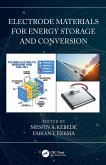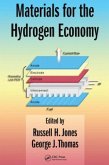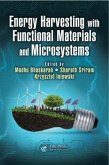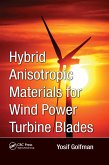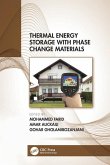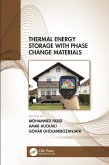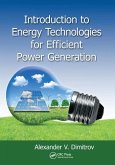Energy Materials
A Circular Economy Approach
Herausgeber: Singh, Surinder; Ibhadon, Alex; Sundaramurthy, Suresh
Energy Materials
A Circular Economy Approach
Herausgeber: Singh, Surinder; Ibhadon, Alex; Sundaramurthy, Suresh
- Gebundenes Buch
- Merkliste
- Auf die Merkliste
- Bewerten Bewerten
- Teilen
- Produkt teilen
- Produkterinnerung
- Produkterinnerung
This book emphasizes the engineering scalability of a circular economy approach to development and use of energy materials. It focuses on waste minimization and its valorization, recycling and reuse, and emerging sustainable materials and technologies required for production of these materials in the process industry and manufacturing sectors.
Andere Kunden interessierten sich auch für
![Electrode Materials for Energy Storage and Conversion Electrode Materials for Energy Storage and Conversion]() Electrode Materials for Energy Storage and Conversion258,99 €
Electrode Materials for Energy Storage and Conversion258,99 €![Materials for the Hydrogen Economy Materials for the Hydrogen Economy]() Materials for the Hydrogen Economy284,99 €
Materials for the Hydrogen Economy284,99 €![Energy Harvesting with Functional Materials and Microsystems Energy Harvesting with Functional Materials and Microsystems]() Energy Harvesting with Functional Materials and Microsystems283,99 €
Energy Harvesting with Functional Materials and Microsystems283,99 €![Hybrid Anisotropic Materials for Wind Power Turbine Blades Hybrid Anisotropic Materials for Wind Power Turbine Blades]() Yosif GolfmanHybrid Anisotropic Materials for Wind Power Turbine Blades92,99 €
Yosif GolfmanHybrid Anisotropic Materials for Wind Power Turbine Blades92,99 €![Thermal Energy Storage with Phase Change Materials Thermal Energy Storage with Phase Change Materials]() Thermal Energy Storage with Phase Change Materials75,99 €
Thermal Energy Storage with Phase Change Materials75,99 €![Thermal Energy Storage with Phase Change Materials Thermal Energy Storage with Phase Change Materials]() Thermal Energy Storage with Phase Change Materials228,99 €
Thermal Energy Storage with Phase Change Materials228,99 €![Introduction to Energy Technologies for Efficient Power Generation Introduction to Energy Technologies for Efficient Power Generation]() Alexander V. DimitrovIntroduction to Energy Technologies for Efficient Power Generation72,99 €
Alexander V. DimitrovIntroduction to Energy Technologies for Efficient Power Generation72,99 €-
-
-
This book emphasizes the engineering scalability of a circular economy approach to development and use of energy materials. It focuses on waste minimization and its valorization, recycling and reuse, and emerging sustainable materials and technologies required for production of these materials in the process industry and manufacturing sectors.
Hinweis: Dieser Artikel kann nur an eine deutsche Lieferadresse ausgeliefert werden.
Hinweis: Dieser Artikel kann nur an eine deutsche Lieferadresse ausgeliefert werden.
Produktdetails
- Produktdetails
- Verlag: CRC Press
- Seitenzahl: 400
- Erscheinungstermin: 29. März 2024
- Englisch
- Abmessung: 240mm x 161mm x 26mm
- Gewicht: 763g
- ISBN-13: 9781032217260
- ISBN-10: 103221726X
- Artikelnr.: 69482950
- Herstellerkennzeichnung
- Libri GmbH
- Europaallee 1
- 36244 Bad Hersfeld
- gpsr@libri.de
- Verlag: CRC Press
- Seitenzahl: 400
- Erscheinungstermin: 29. März 2024
- Englisch
- Abmessung: 240mm x 161mm x 26mm
- Gewicht: 763g
- ISBN-13: 9781032217260
- ISBN-10: 103221726X
- Artikelnr.: 69482950
- Herstellerkennzeichnung
- Libri GmbH
- Europaallee 1
- 36244 Bad Hersfeld
- gpsr@libri.de
Dr. Surinder Singh is Faculty Member at Dr. S. S. Bhatnagar University Institute of Chemical Engineering and Technology, Panjab University, Chandigarh. He earned his Ph.D. from GGSIPU University Delhi and Masters in Chemical Engineering from Panjab University, Chandigarh. Dr. Suresh Sundaramurthy is Faculty & Former Head of Department, Chemical Engineering, Maulana Azad National Institute of Technology (MANIT) Bhopal, India. He received the Ph.D. in Chemical Engineering from Indian Institute of Technology Roorkee, India. Dr. Alex Ibhadon is Professor of Decarbonization, Sustainability and Reactor Engineering at the University of Hull. Dr. Ibhadon is a Fellow of the Royal Society of Chemistry (CChem), Senior Fellow UK Higher Education Academy, and Member Institute of Materials. Dr Ibhadon was the Director, School of Environmental Sciences (2015-2016) and Programme Director, Chemical Engineering (2017-2022) University of Hull. Dr. Ibhadon graduated with a PhD in Physical Polymer Chemistry from the University of Birmingham, United Kingdom. He has received > £7.08M in research funding (twenty-two grant awards) from the UK Royal Society, UK Engineering and Physical Sciences Research Council (EPSRC), Newton, EU, NetZero Innovation, and the Commonwealth. Dr. Faisal Khan is Mike O'Connor II Chair and Interim Department Head & Professor, Department of Chemical Engineering at Texas A&M University, USA. He is also the Director of Mary Kay O'Connor Process Safety Center and the Director of Ocean Energy Safety Institute. Dr. Khan is a former Professor and Canada Research Chair (Tier I) of Offshore Safety and Risk Engineering at Memorial University of Newfoundland, Canada. He is Editor-in-Chief of the Journal of Process Safety & Environmental Protection and Safety in Harsh Environments. Prof. Sushil Kumar Kansal, Fellow Royal Society of Chemistry (FRSC), is Professor at Dr. S. S. Bhatnagar University Institute of Chemical Engineering and Technology, Panjab University, Chandigarh. He is also Dean International students at PU, Chandigarh. Prof. S. K. Mehta, Fellow Royal Society of Chemistry (FRSC), is the Vice Chancellor of University of Ladakh, UT and Professor at the Department of Chemistry. He was the Ex-Chairman, Chemistry and Ex-Director SAIF/CIL/UCIM at Panjab University, Chandigarh. He has been a visiting scientist in the UK, Germany, Japan, USA, and France and has guided 15 postdoctoral, 48 Ph.D., and 50 Master students and handled 20 research projects.
1. Circular economy for energy materials-state of the art initiatives and
regulatory issues. 2. Circular Economy: An Industrial Perspective for
Sustainable Future. 3. Lithium as new gold for advanced energy material,
availability in nature, recovery from waste, and sustainability. 4.
Photo-Catalytic Materials for Production of Hydrogen from Water Using Solar
Energy. 5. Valorisation of lignocellulosic biomass into high value
chemicals: Forging a route towards the circular economy. 6. Sustainable
electrode materials/composites for Batteries and Fuel cells for achieving
supercapacitance and environmentally benign mobility. 7. Carbon-based
heterostructures: A circular economy energy application towards
electrochemical sensors. 8. Technologies for conversion of Biomass to
valuable chemicals and Fuels. 9. Microgrid structure for tapping renewable
energy. 10. Plastic Waste to Value Added Products via Recycling and
Upcycling. 11. Closing the Loop: Circular Economy for Food-Based Emulsions
and Films for Energy Materials. 12. MOF-Based Nanocomposites for Energy
Storage and Supercapacitor Applications. 13. A Circular Economy Approach to
Solar Energy. 14. Recycling Within the Chemical Industry: The Circular
Economy Approach- Industrial Perspectives. 15. The Future Perspectives of
Global Circular Economy Transition and Comprehensive Cost analysis.
regulatory issues. 2. Circular Economy: An Industrial Perspective for
Sustainable Future. 3. Lithium as new gold for advanced energy material,
availability in nature, recovery from waste, and sustainability. 4.
Photo-Catalytic Materials for Production of Hydrogen from Water Using Solar
Energy. 5. Valorisation of lignocellulosic biomass into high value
chemicals: Forging a route towards the circular economy. 6. Sustainable
electrode materials/composites for Batteries and Fuel cells for achieving
supercapacitance and environmentally benign mobility. 7. Carbon-based
heterostructures: A circular economy energy application towards
electrochemical sensors. 8. Technologies for conversion of Biomass to
valuable chemicals and Fuels. 9. Microgrid structure for tapping renewable
energy. 10. Plastic Waste to Value Added Products via Recycling and
Upcycling. 11. Closing the Loop: Circular Economy for Food-Based Emulsions
and Films for Energy Materials. 12. MOF-Based Nanocomposites for Energy
Storage and Supercapacitor Applications. 13. A Circular Economy Approach to
Solar Energy. 14. Recycling Within the Chemical Industry: The Circular
Economy Approach- Industrial Perspectives. 15. The Future Perspectives of
Global Circular Economy Transition and Comprehensive Cost analysis.
1. Circular economy for energy materials-state of the art initiatives and
regulatory issues. 2. Circular Economy: An Industrial Perspective for
Sustainable Future. 3. Lithium as new gold for advanced energy material,
availability in nature, recovery from waste, and sustainability. 4.
Photo-Catalytic Materials for Production of Hydrogen from Water Using Solar
Energy. 5. Valorisation of lignocellulosic biomass into high value
chemicals: Forging a route towards the circular economy. 6. Sustainable
electrode materials/composites for Batteries and Fuel cells for achieving
supercapacitance and environmentally benign mobility. 7. Carbon-based
heterostructures: A circular economy energy application towards
electrochemical sensors. 8. Technologies for conversion of Biomass to
valuable chemicals and Fuels. 9. Microgrid structure for tapping renewable
energy. 10. Plastic Waste to Value Added Products via Recycling and
Upcycling. 11. Closing the Loop: Circular Economy for Food-Based Emulsions
and Films for Energy Materials. 12. MOF-Based Nanocomposites for Energy
Storage and Supercapacitor Applications. 13. A Circular Economy Approach to
Solar Energy. 14. Recycling Within the Chemical Industry: The Circular
Economy Approach- Industrial Perspectives. 15. The Future Perspectives of
Global Circular Economy Transition and Comprehensive Cost analysis.
regulatory issues. 2. Circular Economy: An Industrial Perspective for
Sustainable Future. 3. Lithium as new gold for advanced energy material,
availability in nature, recovery from waste, and sustainability. 4.
Photo-Catalytic Materials for Production of Hydrogen from Water Using Solar
Energy. 5. Valorisation of lignocellulosic biomass into high value
chemicals: Forging a route towards the circular economy. 6. Sustainable
electrode materials/composites for Batteries and Fuel cells for achieving
supercapacitance and environmentally benign mobility. 7. Carbon-based
heterostructures: A circular economy energy application towards
electrochemical sensors. 8. Technologies for conversion of Biomass to
valuable chemicals and Fuels. 9. Microgrid structure for tapping renewable
energy. 10. Plastic Waste to Value Added Products via Recycling and
Upcycling. 11. Closing the Loop: Circular Economy for Food-Based Emulsions
and Films for Energy Materials. 12. MOF-Based Nanocomposites for Energy
Storage and Supercapacitor Applications. 13. A Circular Economy Approach to
Solar Energy. 14. Recycling Within the Chemical Industry: The Circular
Economy Approach- Industrial Perspectives. 15. The Future Perspectives of
Global Circular Economy Transition and Comprehensive Cost analysis.


